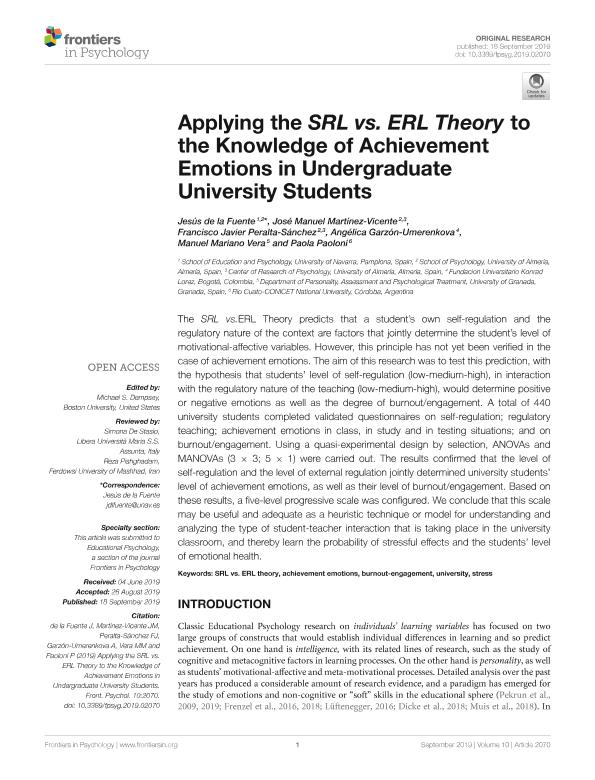Mostrar el registro sencillo del ítem
dc.contributor.author
de la Fuente, Jesús
dc.contributor.author
Martínez-Vicente, José Manuel
dc.contributor.author
Peralta-Sánchez, Francisco Javier
dc.contributor.author
Garzón-Umerenkova, Angélica
dc.contributor.author
Vera, Manuel Mariano
dc.contributor.author
Paoloni, Paola Veronica Rita

dc.date.available
2021-02-19T17:48:19Z
dc.date.issued
2019-09
dc.identifier.citation
de la Fuente, Jesús; Martínez-Vicente, José Manuel; Peralta-Sánchez, Francisco Javier; Garzón-Umerenkova, Angélica; Vera, Manuel Mariano; et al.; Applying the SRL vs. ERL Theory to the Knowledge of Achievement Emotions in Undergraduate University Students; Frontiers Research Foundation; Frontiers in Psychology; 10; 2070; 9-2019; 1-17
dc.identifier.issn
1664-1078
dc.identifier.uri
http://hdl.handle.net/11336/126117
dc.description.abstract
The SRL vs.ERL Theory predicts that a student's own self-regulation and the regulatory nature of the context are factors that jointly determine the student's level of motivational-affective variables. However, this principle has not yet been verified in the case of achievement emotions. The aim of this research was to test this prediction, with the hypothesis that students' level of self-regulation (low-medium-high), in interaction with the regulatory nature of the teaching (low-medium-high), would determine positive or negative emotions as well as the degree of burnout/engagement. A total of 440 university students completed validated questionnaires on self-regulation; regulatory teaching; achievement emotions in class, in study and in testing situations; and on burnout/engagement. Using a quasi-experimental design by selection, ANOVAs and MANOVAs (3 × 3; 5 × 1) were carried out. The results confirmed that the level of self-regulation and the level of external regulation jointly determined university students' level of achievement emotions, as well as their level of burnout/engagement. Based on these results, a five-level progressive scale was configured. We conclude that this scale may be useful and adequate as a heuristic technique or model for understanding and analyzing the type of student-teacher interaction that is taking place in the university classroom, and thereby learn the probability of stressful effects and the students' level of emotional health.
dc.format
application/pdf
dc.language.iso
eng
dc.publisher
Frontiers Research Foundation

dc.rights
info:eu-repo/semantics/openAccess
dc.rights.uri
https://creativecommons.org/licenses/by/2.5/ar/
dc.subject
ACHIEVEMENT EMOTIONS
dc.subject
BURNOUT-ENGAGEMENT
dc.subject
SRL VS. ERL THEORY
dc.subject
STRESS
dc.subject
UNIVERSITY
dc.subject.classification
Otras Psicología

dc.subject.classification
Psicología

dc.subject.classification
CIENCIAS SOCIALES

dc.subject.classification
Otras Ciencias de la Educación

dc.subject.classification
Ciencias de la Educación

dc.subject.classification
CIENCIAS SOCIALES

dc.title
Applying the SRL vs. ERL Theory to the Knowledge of Achievement Emotions in Undergraduate University Students
dc.type
info:eu-repo/semantics/article
dc.type
info:ar-repo/semantics/artículo
dc.type
info:eu-repo/semantics/publishedVersion
dc.date.updated
2020-12-03T13:22:40Z
dc.journal.volume
10
dc.journal.number
2070
dc.journal.pagination
1-17
dc.journal.pais
Estados Unidos

dc.journal.ciudad
Nueva York
dc.description.fil
Fil: de la Fuente, Jesús. Universidad de Almeria; España. Universidad de Navarra; España
dc.description.fil
Fil: Martínez-Vicente, José Manuel. Universidad de Almeria; España
dc.description.fil
Fil: Peralta-Sánchez, Francisco Javier. Fundacion Universitaria Konrad Lorenz.; Colombia
dc.description.fil
Fil: Garzón-Umerenkova, Angélica. Fundacion Universitaria Konrad Lorenz.; Colombia
dc.description.fil
Fil: Vera, Manuel Mariano. Universidad de Granada; España
dc.description.fil
Fil: Paoloni, Paola Veronica Rita. Universidad Nacional de Rio Cuarto. Instituto de Investigaciones Sociales, Territoriales y Educativas. - Consejo Nacional de Investigaciones Científicas y Técnicas. Centro Científico Tecnológico Conicet - Córdoba. Instituto de Investigaciones Sociales, Territoriales y Educativas; Argentina
dc.journal.title
Frontiers in Psychology
dc.relation.alternativeid
info:eu-repo/semantics/altIdentifier/url/https://www.frontiersin.org/article/10.3389/fpsyg.2019.02070
dc.relation.alternativeid
info:eu-repo/semantics/altIdentifier/url/https://www.ncbi.nlm.nih.gov/pmc/articles/PMC6760021/
dc.relation.alternativeid
info:eu-repo/semantics/altIdentifier/doi/https://doi.org/10.3389/fpsyg.2019.02070
Archivos asociados
